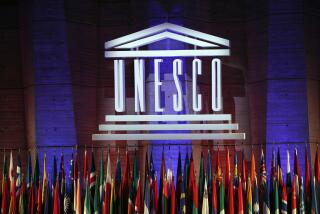UNESCO: No Choice for Britain
- Share via
The British government had been left no acceptable alternative to quitting the U.N. Educational, Scientific and Cultural Organization. In the year since the United States withdrew, no fundamental reforms had been implemented, and the same irresponsible leadership of Amadou-Mahtar M’Bow, the director general, had continued.
Some other reluctant members, including West Germany, have chosen to remain in UNESCO because they perceived signs of a commitment to reform at the general conference that concluded last month in Sofia, Bulgaria. That perception was more a hope than a reality, however.
It is now clearer than ever that little can be done to make right this important and potentially useful organization until M’Bow is replaced. His willingness to politicize the organization, to play ideological games, has ready support from a substantial number of Third World nations and from the Soviet Bloc. Perhaps he can take satisfaction from that. But the drift of the agency can only be deeply troubling to Western nations, which see their values flouted and their money wasted. There are better ways to facilitate the important struggle in the world to increase literacy, to protect cultural resources, to share scientific knowledge.
Britain’s withdrawal may add the pressure needed to bring true reform. Then both the United States and the United Kingdom could return.
M’Bow opened the Sofia conference with an address suggesting that action against UNESCO is a blow against “the heart of the United Nations system.” In a way he was right, for the betrayal of its trust by UNESCO has eroded confidence in multilateral organizations. But he missed the real point: his own role in the deteriorating situation. “UNESCO, and through it the whole of the United Nations system, must be preserved, cost what it may,” he said. He did not, however, seem to recognize that part of the cost is his resignation.
More to Read
Sign up for Essential California
The most important California stories and recommendations in your inbox every morning.
You may occasionally receive promotional content from the Los Angeles Times.













